Bearded Collies are strong and agile dogs with long, lean bodies and a medium-length, flat coat that is shaggy and harsh. These dogs are born blue, brown, black, or fawn, and their coat often lightens with age. Some Beardies have white markings while others do not. Their facial hair is long (hence the breed's name), and these dogs have large noses, wide-set and expressive eyes, and a soft and furry undercoat. They measure 20 to 22 inches at the shoulder and weigh 45 to 55 pounds. Bearded Collies live up to 14 years.
They are outgoing and loving and make very good family pets.
Bearded Collies are active dogs that benefit from a lot of physical activity. They are outgoing and loving and make very good family pets. Their coat requires a significant amount of grooming, however, and the breed may not be a good choice for people with limited time to devote to coat care.
The eye color of these dogs matches their coat color, so that dark-colored dogs have brown eyes, fawn Beardies have light-brown/hazel eyes, and white-blue dogs have grayish eyes.
Bearded Collies are friendly, outgoing, active dogs that make great and devoted family pets. They are affectionate and adaptable and tend to get along well with children, cats, and other dogs. Their silly, playful, and sometimes boisterous nature makes them a lot of fun to have around, but their large size can make them dangerous playmates for small children.
These dogs are athletic and need a lot of physical activity to burn through their excess energy. They do well in apartments, provided they are taken for frequent walks, but they are happiest in a home with a yard. As intelligent and naturally curious dogs, Beardies bore fairly quickly. Toys and games can provide mental stimulation when human companions are not around.
When it comes to Bearded Collies, temperament and personality are very individualized. Some are more outgoing, loving, or confident than others.
Beardies are a generally healthy breed, but they do suffer from hip dysplasia, elbow dysplasia, and some other conditions more often than other breeds. Eye diseases, such as progressive retinal atrophy, persistent pupillary membranes, and cataracts, as well as epilepsy, Addison's disease, and von Willebrand disease are also known to occur in Bearded Collies. These dogs may also develop autoimmune thyroiditis or pemphigus foliaceous, a skin condition.
Bearded Collies need regular exercise in the form of jogging or vigorous play every day to use up excess energy, remain healthy, and maintain a safe weight. Obesity in dogs poses several very serious health effects, including an increased risk of heart disease, arthritis, diabetes, and cancer. Additionally, the coat of Beardies should be checked frequently for ticks.
With daily exercise, proper nutrition, and routine veterinary care and vaccinations, Bearded Collies live 12 to 14 years.
Bearded Collies are very territorial and are prone to loud and excessive barking. Without training, these behaviors can cause problems with neighbors. Training should begin before the Beardie grows too large to manage. Positive reinforcement and a lot of patience are necessary for productive training sessions. These dogs are stubborn, but they are also extremely intelligent and learn quickly. Because of this, Beardies generally respond well to training that includes praise and play rewards.
Socialization in early life is important to prevent problems. Puppy kindergarten and dog parks are great ways to socialize young Beardies. Bearded Collie puppies should be purchased only from breeders who keep pups around other animals and in an environment where they are exposed to a variety of sights and sounds.
Beardies do well in rally, obedience, agility, herding, and other dog sports, and they need an outlet for their energy to prevent negative behaviors. These dogs may become aggressive and destructive if left outside or ignored. While a short time outside in a securely fenced yard is okay, this breed should spend most of the day and night inside with family.
Bearded Collies require a lot of grooming, including daily brushing and combing, and this should be a consideration before adoption or purchase. Brushing with a pin or slicker brush or combing with a stainless steel comb will keep tangles under control. Misting with a detangler or clean water before brushing will help prevent hair damage.
The feet of these dogs tend to attract mud, dirt, sticks, leaves, and other debris, and it may be beneficial to trim the feet to keep them clean and improve appearance. Shedding is only a serious problem for a few months each year.
Bearded Collies need bathing every month or two, or more often if the hindquarters become soiled with feces. The nails should be trimmed once each month, the teeth require regular brushing, and the ears must be checked weekly for wax buildup, dirtiness, and signs of infection. Beardies resistant to grooming might need a professional groomer. Starting grooming early in life can improve cooperation.
Bearded Collies are one of the oldest breeds in Britain. They were used for herding for such a long time in Scotland that they became known as Highland Collies.
The breed is a likely descendent of Highland Collies and Polish Owczarek Nizinny dogs. According to reports, a Polish ship traded three Polish Owczarek Nizinny dogs for one ewe and one ram. The Scots crossed the Polish Owczarek Nizinny dogs with the Highlands to create the breed we know today.
The breed was used primarily to drive flocks of animals to market during the 17th and 18th centuries. They did not become popular in the United States until the 1960s. Bearded Collies were bred to herd, but these dogs are also popular in the obedience, agility, and conformation rings in shows.
The American Kennel Club officially recognized the Bearded Collie in 1976.

